A toast to Tipsy Collective: 14 brands in 5 years, continuing strong after co-founder’s passing
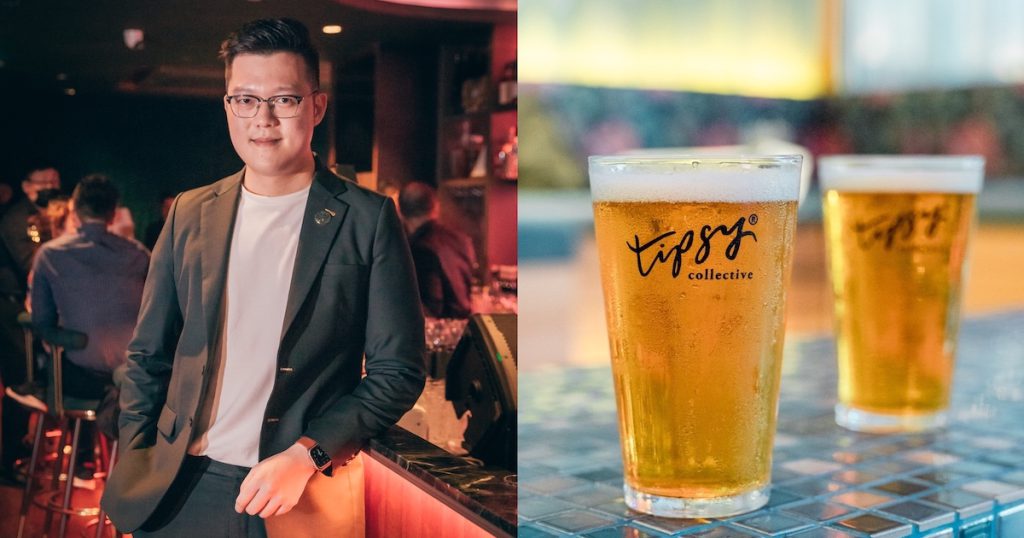
The loss of a co-founder and the delay of a highly anticipated project could have easily derailed many businesses. However, for Tipsy Collective — a homegrown group of distinctive F&B and lifestyle concepts — adversity has only fuelled their determination to turn dreams into reality.
Derek Ong, one-half of the founding team of Tipsy Collective, was the charismatic visionary whose boundless creativity and entrepreneurial spirit guided the collective’s journey.
However, Derek’s remarkable tale is one marked not only by triumphs, but also by an immense loss that struck at the young age of 35.
Following his untimely passing last month, Tipsy Collective not only lost a co-founder, but also a cherished friend and creative genius. Derek’s contributions to the collective were nothing short of extraordinary, and his absence left a void that was deeply felt by all who knew him.
Yet, in the face of this profound loss, the Tipsy Collective community rallied together to honour his legacy and carry forward the torch that he lit.
Both co-founders dabbled in F&B since the age of 17
Over a decade ago, David Gan — the other co-founder of Tipsy Collective — and Derek’s paths converged during a church mission trip to the Philippines.
Bonded by their shared commitment to give back to the underprivileged, this serendipitous meeting set the stage for an enduring friendship that would later reshape Singapore’s F&B landscape.
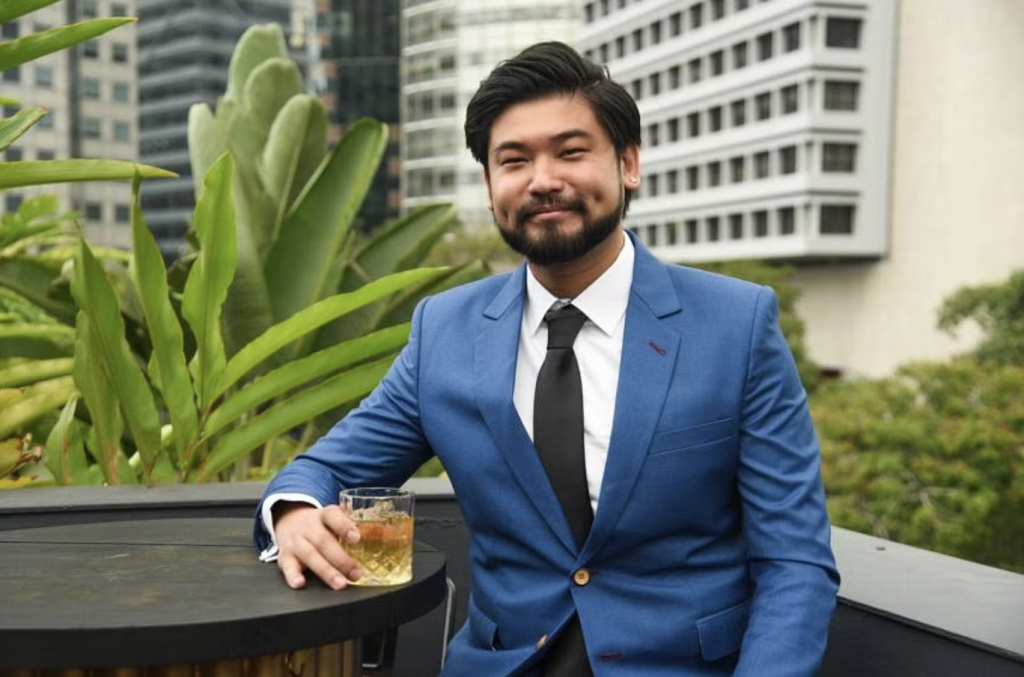
Derek’s journey in the Food and Beverage (F&B) industry started at the tender age of 17, when he embarked on a career as a bartender.
After completing his national service, Derek’s passion for F&B led him to join another F&B group in 2011. During his tenure, Derek oversaw the expansion of the company’s portfolio from two to eight outlets in a short span of time. As General Manager, he managed a workforce of over 200 employees, gaining invaluable experience that would ultimately fuel his entrepreneurial ambitions.
Derek’s entrepreneurial spirit led him to initiate several ventures, including the creation of a unique halal fish bak kwa, which secured startup funding from SPRING Singapore. He also ventured into the burger business and notably operated Central Perk Café, the official Friends-themed café licensed by Warner Brothers.
In contrast, David’s path into the F&B world was influenced by his second-generation background in the industry. From a young age, he was exposed to the diverse facets of F&B and hospitality, from serving traditional zi char dishes in industrial canteens to working in modern tapas bars and cafes in Canada.
At the age of 17, David took his first entrepreneurial step into the world of F&B, attempting to run a Western food stall in an industrial canteen. Though this venture didn’t go exactly as planned, his passion for the industry remained unwavering. He explored other industries, including roles in private schools and banks, but the allure of F&B drew him back.
In 2016, David ventured into the café business in Canada, growing it from a single outlet to four successful locations. Eventually, he returned to Singapore, where fate brought him together with Derek to establish Tipsy Collective in 2018.
Built 14 brands in the span of five years
Tipsy Collective’s journey began with a simple question: “Why not bring the party to the heartlands?”
Prior to our inception, the majority of the popular drinking and entertainment establishments were primarily situated in town. Having grown up in the neighbourhood, we often found it inconvenient to commute to town for social gatherings, live performances, and parties.
– David Gan, co-founder and Executive Chairman of Tipsy Collective
Their answer to that was Tipsy Penguin, their very first concept which opened doors in Tampines back in 2018.
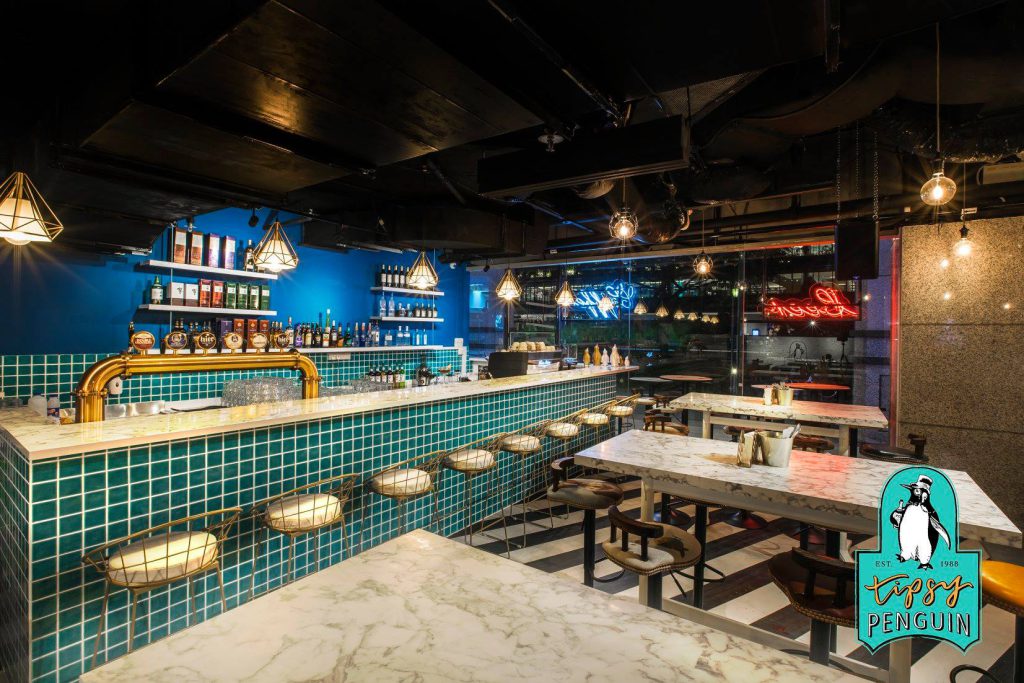
The name, inspired by the sociable penguins that huddle for warmth, set the tone for what Tipsy Collective aimed to achieve: an inviting social environment where individuals could bond, enjoy themselves, and get tipsy while having fun.
The inception of Tipsy Collective came with a significant financial commitment.
We initially invested S$250,000 in our first outlet. … At the outset, we had just enough capital to cover the rental deposits for our outlet.
As a new startup with no established track record, we faced some funding challenges during this phase as traditional sources like banks were hesitant to provide loans, and potential investors had their doubts.
– David Gan, co-founder and Executive Chairman of Tipsy Collective
However, David and his team were determined to realise their vision. Through careful cash flow planning and perseverance, they secured the necessary funding, and it took them approximately six months to break even.
Following Tipsy Collective, they’ve introduced a range of other unique concepts, each with its own distinct theme and identity.
In 2019, they launched rooftop bar Lady Wu and gastrobar Tipsy Bird. The following year, they introduced Hadouken! Singapore as their online food delivery arm, as well as Tipsy Bunny, known for its innovative take on classic dishes.
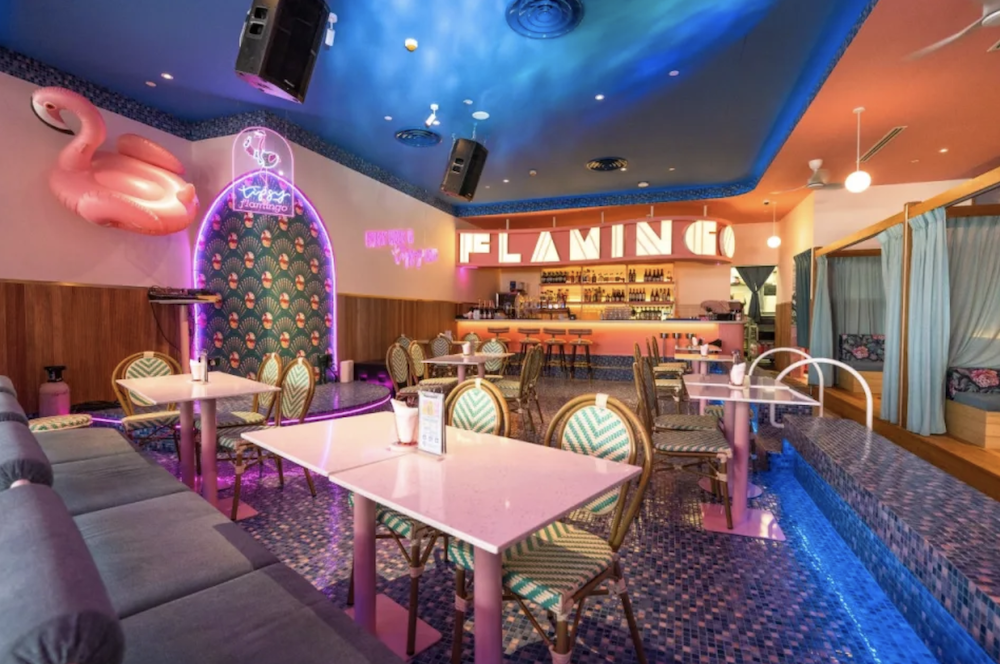
The year 2021 marked the birth of several venues, including their first live entertainment gastrobar Tipsy Panda; O/T (short for ‘Only Tipsy’) Bar, the first bespoke cocktail bar in the heartlands that’s inspired by the 1940s Manhattan office ambience; as well as Tipsy Flamingo, a beach-themed concept launched in collaboration with local celebrity couple Pierre Png and Andrea De Cruz, exuding the essence of summer with its vibrant colours, an indoor ‘pool’, and seaside cabanas.
That same year, it also ventured into the entertainment arena with Tipsy Live Academy, a singing and DJ academy.
In 2022, Tipsy Collective continued to push culinary boundaries with the introduction of Kubô Woodfired Kitchen, Jelebu Dry Laksa, and the Tiki-inspired gastrobar Tipsy Hippo.
This year, they also unveiled Wallich Manor, a high-energy cocktails and bubbles super lounge.
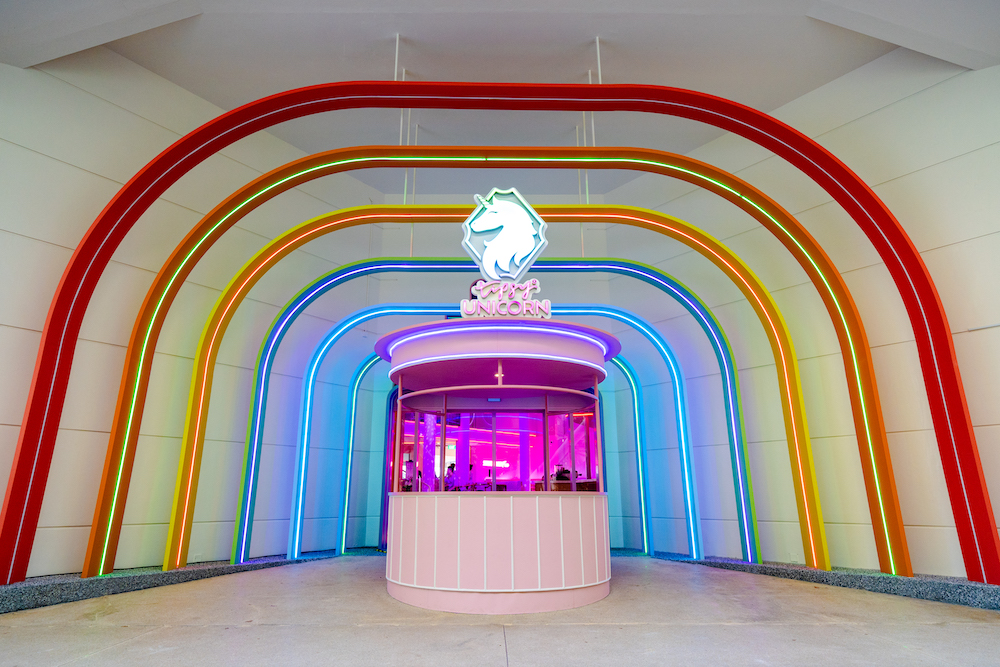
Their most recent addition to the portfolio is Tipsy Unicorn, located on Sentosa Island. Launched in September, it offers a Vegas-style day club experience that adds an alluring beachside twist to Singapore’s entertainment landscape. Guests can indulge in live bands, renowned DJs, fitness and wellness programmes, and an extensive array of food and beverages.
Tipsy Unicorn places a strong emphasis on design and entertainment, boasting the largest stage in the local beach club scene, reaffirming their commitment to providing top-notch entertainment.
Tipsy Unicorn is a tribute to Derek’s vision and spirit
However, the journey to bring Tipsy Unicorn to life has been marked by a poignant loss — the recent passing of Derek — which led to the postponement of its initial launch.
The eventual launch of Tipsy Unicorn holds deep significance, serving as a heartfelt tribute to the vision and spirit of Derek.

“Tipsy Unicorn has been a dream of both Derek and myself for the longest time. It marks the inauguration of our Tipsy Mystical Series, distinct from our other Tipsy outlets primarily characterised by animal themes,” explained David.
“This series embodies our transition towards a more lifestyle entertainment-centric business approach.”
He went on to emphasise Derek’s pivotal role in shaping Tipsy Collective’s identity, fondly recalling Derek’s creative energy and his knack for thinking outside the box. “One thing you could always count on with Derek is that he had the wildest ideas in the room,” David said.
David shared stories of their brainstorming sessions, where Derek’s imaginative ideas took centrestage. One of the most memorable moments was when Derek suggested installing a Firefox swing for guests to enjoy after indulging in drinks — a whimsical idea that perfectly embodied his playful spirit.
There was another time when he proposed installing a track system at Tipsy Unicorn to lower the bottle server, enabling the direct delivery of drinks to guests.
Derek’s passing represents a profound moment, not just for Tipsy Collective, but for the entire industry.
[His] experiences in the industry truly shaped the foundation and values of what Tipsy Collective is about. He was not only a visionary, but also someone who knows how to infuse fun and creativity into everything we do. Thanks to Derek, we’ve become known for our unique experiences and daring ideas.
– David Gan, co-founder and Executive Chairman of Tipsy Collective
Adaptability amid shifting demands
Besides the sudden loss of its co-founder, Tipsy Collective has faced its fair share of challenges over the years, with one of the most persistent being the ever-changing demands and dynamics of the industry.
“It’s important to stay agile and responsive,” David emphasised. “We regularly update our offerings and strategies to align with shifting demands.”
One notable example of this adaptability is their approach to emerging food trends. When trends capture people’s interests, Tipsy Collective infuses them with its “unique Tipsy touch”, such as putting a personalised twist on its highly-raved Basque burnt cheesecake.
The COVID-19 pandemic inevitably presented an unprecedented challenge to the entire hospitality sector, forcing businesses to confront uncertainty and adapt rapidly.
At Tipsy Collective, we firmly believe that innovation can arise from any experience. … Rather than viewing [the pandemic] solely as a threat, we rcognised it as an opportunity for adaptation and innovation.
– David Gan, co-founder and Executive Chairman of Tipsy Collective
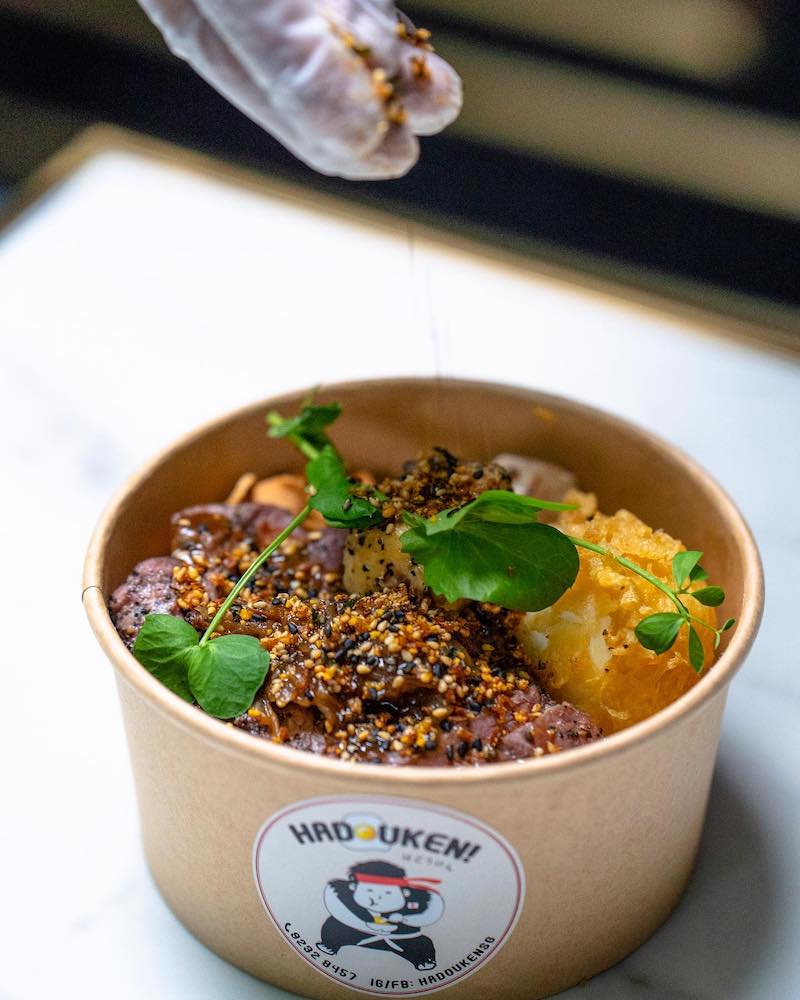
In response to the challenges posed by the pandemic, they pivoted to offer takeout and delivery services. They swiftly launched their online food delivery arm on 7 April 2020, coinciding with the onset of the Circuit Breaker measures in Singapore.
“While the pandemic initially posed a threat to our business, it also provided an opportunity for us to diversity and demonstrate our resilience by adapting to changing circumstances.”
“Hadouken! Singapore not only helped us weather the storm, but also allowed us to keep our team intact. We didn’t have to lay off any staff members during this period of uncertainty,” added David.
Additionally, the increased demand for takeaway packaging led Tipsy Collective to take a significant step towards sustainability by fully transitioning to the use of biodegradable packaging at all of its outlets.
This commitment reflects their dedication to not only surviving the pandemic, but also thriving responsibly by minimising their environmental footprint. It’s their way of giving back to the community and the planet while navigating the uncertainties brought on by the pandemic.
As David shares the challenges faced and overcome by Tipsy Collective, it becomes clear that consistency and excellence have been their guiding principles.
Expanding to Malaysia next
In a saturated F&B industry, Tipsy Collective’s enduring and thriving strategy centres around its relentless commitment to innovation and creativity.
Their ability to consistently reinvent themselves and challenge the status quo, not only in culinary offerings but also in customer engagement and emerging trends, sets them apart.
According to David, Tipsy Collective’s long-term vision is to maintain and strengthen their position as the leading lifestyle hospitality group.
They plan to achieve this by prioritising innovation and adaptability in an ever-changing market, which he describes as two pillars that will be instrumental in ensuring the sustainability and continuous growth of the brand.
With regards to global expansion plans, David shared that they have two upcoming outlets opening in Kuala Lumpur, Malaysia.
“We remain resolute in our commitment to our expansion plans set before Derek’s departure, ensuring that the collective carries on his legacy with steadfast determination,” he added.
Throughout their journey so far, David assured that their dedication to delivering the ‘Tipsy experience’ has remained steadfast, ensuring that each outlet radiates a welcoming, communal atmosphere.
He added that the core values established by himself and Derek will persist as the very bedrock of the company, serving as a guiding force and inspiration for every team member.
Featured Image Credit: Tipsy Collective
Embark on your startup journey with MAS-regulated ANEXT Bank, one of Singapore’s first digital banks for SMEs.
Also Read: Founders of Indonesian unicorn Kopi Kenangan on building a coffee empire and entering S’pore
In a huge update, ChatGPT can now see, hear, speak, generate images and access the internet

Disclaimer: Any opinions expressed below belong solely to the author.
As smart as ChatGPT has already proven itself to be, it’s been thus far hindered by very limited input and output channels. You could only type with it, and it would type back. Text in, text out.
Another limitation was the fact that it operated only on what it has been taught up to September 2021 — two years out of date, which prevented it from being a useful alternative to search engines for seeking current information.
But OpenAI has been busy at work, preparing a slew of updates, through which it is taking one massive swipe at all of its competitors at once.
We have already covered its updated image generator, Dall-E, which is being merged into ChatGPT, while providing demonstrably superior capabilities to rivals like Midjourney and open-source Stable Diffusion.
Starting October, you will be able to simply ask it to quickly render any image for you at will and near instantly.
Turns out, it was only an appetiser.
A picture is worth a thousand words
As humans, we know firsthand how much better it is to see something instead of only imagining it based on a verbal description. Conversely, trying to describe something accurately is far more tedious than simply showing it.
It was only a question of time then, that artificial intelligence (AI) would have to acquire the same senses that we have in order for communication between us to be as seamless and productive as possible.
That moment has finally come, as earlier this week, OpenAI announced that by mid-October, its flagship product is going to be able to also see, hear and speak, changing the way we interact with it:
“Voice and image give you more ways to use ChatGPT in your life. Snap a picture of a landmark while traveling and have a live conversation about what’s interesting about it.
When you’re home, snap pictures of your fridge and pantry to figure out what’s for dinner (and ask follow up questions for a step-by-step recipe). After dinner, help your child with a math problem by taking a photo, circling the problem set, and having it share hints with both of you.”

If we could quantify it, I’m sure it would qualify to be called an exponential growth in usability. Forget having to type — show it, say it, take a picture, ask a question and listen to the answer.
Given how ubiquitous cameras and microphones have become — with pretty much everyone carrying one (or more) in our pockets all the time — ChatGPT is morphing into an ever-present assistant that you can ask for help on the go.
It could also make augmented reality (AR) gear, such as the recently-announced second generation of Meta’s RayBan smart glasses equipped with a camera, speakers and microphone, really useful by allowing you to seamlessly consult ChatGPT without even reaching into your pocket.

This may very well be the missing element that all sorts of smart glasses have lacked over the years since the launch to now-retired Google Glass a decade ago.
Instead of trying to create a persistent display in front of our eyes, why not simply use a built-in camera to have an AI assistant see what we see and hear what we both hear and say to him?
No need for sophisticated optical trickery — just a James Bond-esque gadget, seeing and processing more information on the fly that we could ever do, providing the right information straight into our ears.
The end of Google
As if that wasn’t enough for one week, OpenAI has topped it off with a cherry that everybody was waiting for: ChatGPT will finally start roaming the internet in real-time. No more limitations, you can ask it about anything and it will return answers and links to sources.
Following partnership with Microsoft (and the company’s massive investment in OpenAI), the feature is built on top of Bing, browsing through which you will need to enable in ChatGPT to get live results.
It is also a major challenge to Google, whose Bard failed to take off in quite a similar fashion just yet.
Interfacing via existing search engines is painfully clunky compared to an intelligent bot. Many results are still elevated through questionable SEO practices and it often takes some time before you dig out the information you were really looking for (while avoiding scams, spam, and malware).
In contrast, a chatbot provides you with an accurate answer in seconds, skipping through all the irrelevant noise. It’s bound to change the way we look for information on the internet, even if it doesn’t entirely wipe out traditional search engines.
They may remain as a safety valve, in case you want to manually verify the veracity of whatever the seemingly intelligent assistant has told you — but it’s likely to be an edge, niche case, than the mainstream it is today.
It doesn’t take long to realise that it poses an existential threat to Google — one of the largest tech companies on the planet, which has been enjoying a de facto monopoly on web search all over the world, that also accounts for close to 60 per cent of its annual revenue coming from advertising targeting specific keywords.
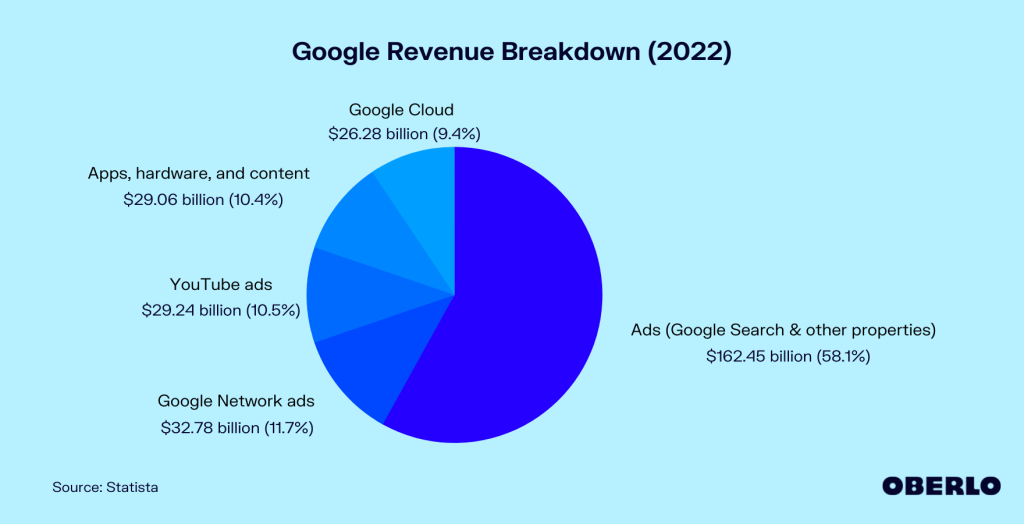
Even if Google is able to come out on top in the battle of AI chatbots somehow — which doesn’t seem likely at the moment — the format AI answers are provided in precludes placement of many ads next to it.
Currently, a search results page is a list of hundreds of links, spread across multiple pages (on desktop) or a long scrollable wall (on mobile), in between which advertising for dozens of companies is placed.
But as AI bots simply provide an answer and/or point to a particular source, you can’t offer nearly as many slots for ads as before, without completely overwhelming the user.
While it seems it should still be possible to draw some money from queries in which users specifically ask for providers of particular services (who could pay to be promoted), monetisation of millions of other search terms may become extremely difficult.
This affects not only Google’s search revenue but display advertising as well, as banners are placed next to content — but much less of it will be consumed if people get what they want within an app such as ChatGPT.
If they don’t browse websites, they won’t read articles and click on ads, hurting both publishers and Google.
Together, this undermines nearly 70 per cent of Google’s current revenue and it doesn’t seem that the company has a response to it, still playing catch-up to ChatGPT’s usability.
OpenAI may not be moving very quickly. After all, it’s been almost a year since the launch of ChatGPT 3.5 and its fourth iteration launched in March has brought only moderate improvements, which came at a relatively high price and use limits — but when it does, it sure puts the fear of God into its rivals.
Generative AI art competitors, other intelligent chatbots, and even some of the world’s largest companies, like Google or Meta (which announced a partnership with Bing — so, by extension, ChatGPT) either have to find a response or a way join it before it puts them out of business.
Featured Image Credit: CoinGeek
Also Read: In an impressive video, Tesla Bot recognises own limbs and shows awareness of surroundings
Why this property developer is hosting a music fest in Kuching with a lineup of K-Pop stars
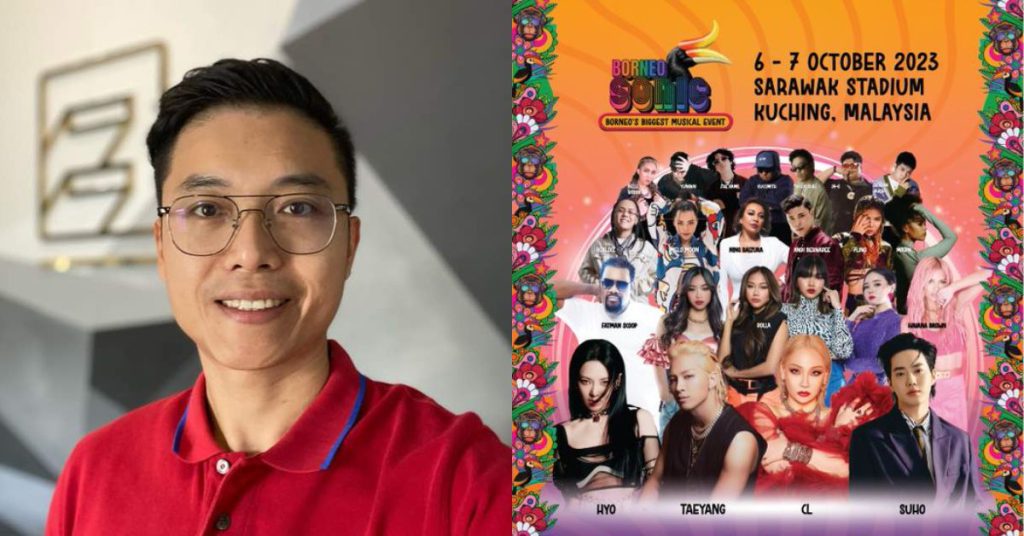
Anyone who’s into K-Pop would likely have heard of an upcoming festival by the name of Borneo Sonic Music Festival (BSMF).
Dubbed “Borneo’s biggest music event” by the organisers themselves, the inaugural festival happening October 6 and 7 will facilitate 20 performances.
Headliners include HYO (from Girl’s Generation), CL (from 2NE1), Taeyang (from Big Bang), and Suho (from EXO), amongst other famous acts.
It doesn’t take someone in the industry to know that booking these talents—especially for a first-time festival—is not easy at all.
That’s why it’s even more surprising to learn that the man behind it all is not actually an event organiser by trade.
Meet Steven Au
“I am a property developer (by day) and event organiser (by night), like Batman,” the founder shared with Vulcan Post.
While he’s jesting about being a vigilante (we think), it’s true that Steven’s background is as a property developer.
He’s the managing director of a development company in Kuching by the name of Benta Mewah, which makes up the first two initials of the event company BME International. The E stands for entertainment.
As for the addition of “International”, Steven says that indicates his ambition of bringing his projects abroad, namely Australia, in the near future.
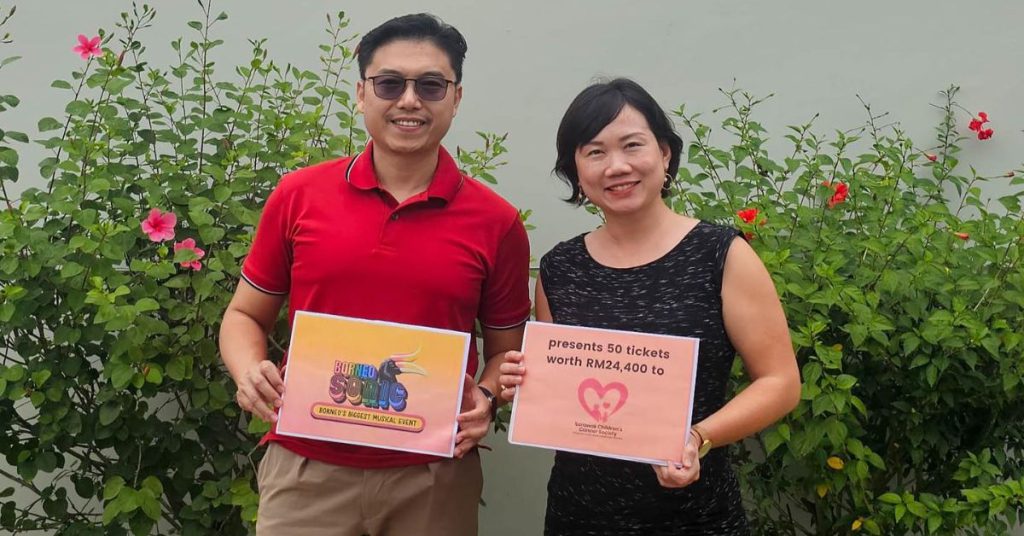
Introducing himself, Steven shared, “I love meeting new people and love creating things that are enjoyed and appreciated by people. That’s why I’ve been in property development for over 13 years.”
The reason for starting BSMF is actually related to his property development career too.
Over the years, Steven has noticed a lack of entertainment activities in Kuching. This in turn results in less people investing in properties in the area.
“So, I hope I can do something about this and build the brand of BSMF to be an international event, attracting more people to fly in and stimulate the property industry and other sectors,” he proudly shared.
Take two
Technically, this isn’t the first such event that Steven has organised.
A few years ago, he had actually initiated the efforts for Borneo Music Festival, which featured a lineup that included Alan Walker and DJ Soda.
“I saw the opportunity in it when we have Rainforest Music Festival, which brings music lovers from around the world to Sarawak to enjoy music and drinks, which you don’t see it in other parts of Malaysia,” Steven explained.
Jumping on the opportunity, he decided to bring in a popular male DJ as well as a female DJ.
However, the COVID-19 lockdowns occurred. The team had no choice but to postpone the event that was slated to happen in April 2020. Six months turned into a year, and by mid-2021, Steven decided he had to sell it to investors.

The music festival was eventually carried out by October 2022, but Steven was no longer involved.
Seeing the announcement of Borneo Music Festival confirming their event date, Steven thought to himself, ‘That would’ve been me’.
“Then I thought again, ‘Why not I do it with a different genre and different market?’ So, I started brainstorming for BSMF.”
Good things don’t come easy
With support from family and friends, as well as from Datuk Sri Karim, the tourism minister of Sarawak, Steven set off to make the BSMF dream come true.
But of course, dreams are only dreams until the work is actually put in. And the work that went into BSMF is nothing to scoff at.
Booking talents that people will show up for is naturally one of the biggest concerns.
“There are language barriers and cultural differences, and these surely have been extra challenges,” Steven shared.
“It took us about five months to finalise the line up. With the plan of making this big and impactful, we have to look for an artist that is popular yet matured, as it’s very sensitive to perform in Malaysia after recent incidents.”
Of course, he’s referring to the incident with The 1975 that happened during Good Vibes Festival, which not only affected festgoers and vendors, but also the industry at large.
“We have to pick artists without issue in the past and tendency of doing ‘funny’ things to challenge the authorities,” Steven pointed out.
However, this was only one hurdle. In fact, getting artists on board is nothing compared to actually selling tickets.
For those curious, the two-day ticket prices start at RM488 for Cat-5, RM488 for Cat-4, RM688 for Cat-3, RM788 for Cat-2, and RM888 for Cat-1. VIP tickets are RM1,288.
As Steven said, “There are too many challenges, other than getting artist into land of Borneo, the bigger challenge is to get locals to buy tickets. No joke. It’s more stressful than getting Korean artists in.”
While BSMF was well received from oversea fans, Steven reported according to the sales data, things were different with the local market.
“Many of the locals are not well exposed to concert or music festivals, especially such a scale of events,” he said.

“There are also groups being sceptical as there are many cancellations of concerts, some are expecting our event will eventually cancel due to marketing gimmick to sell big names who never make it to Kuching.”
Working with authorities and getting permits are things to worry over, too, especially as BSMF would be one of the biggest music shows in Kuching.
According to Steven, Sarawak Stadium, which BSMF will be hosted in, has not housed any big events other than sports events.
Perhaps this is one of the reasons why BSMF actually ran into some trouble on September 16 when they had to change the seating plan. This resulted in some negative feedback from commenters.
However, the organisers took the feedback in stride and revised the seating plan once more. That said, there are still negative comments, but inquiries about the event are also still pouring in.
Putting Borneo on the music tourism map
Although the reception hasn’t been that great, Steven is still positive about the bigger picture and is working with long-term goals such as BSMF 2.0 and 3.0 in mind.
“Numbers of tickets sold aren’t as great as we expected but still at great potential side as many concertgoers are last-minute walk-ins,” he said.
“I believe people will act quickly and feeling [FOMO] after seeing artists arriving at the airport, flooded with fans. Then they will move their legs to buy tickets.”
Post-BSMF, BME International has other plans in the works. For one, the team aims to organise smaller-scale concerts and facilitate fan meet-and-greets.

For BSMF, Steven said he definitely aims to organise it as an annual event.
“As mentioned above, the concert culture here is not as great as West Malaysia,” Steven pointed out. “We have festivals that are mainly organised by government agencies to celebrate National Day and festive events, but not a big music concert or music festival by private sectors.”
However, with time and efforts from the local industry, relevant infrastructure such as accommodations and transport systems have improved significantly, Steven said.
Coupled with the effort and passion from teams such as BME International, perhaps Sarawak will grow into a global destination for music events.
- Learn more about Borneo Sonic Music Festival here.
- Read other articles we’ve written about entertainment here.
Also Read: This free startup event lets founders learn through leaders from Dropee, Fave & Sellercraft
Featured Image Credit: Borneo Sonic Music Festival
How the 3rd-gen owner of this M’sian uniform biz ensures his grandpa’s legacy isn’t stagnant
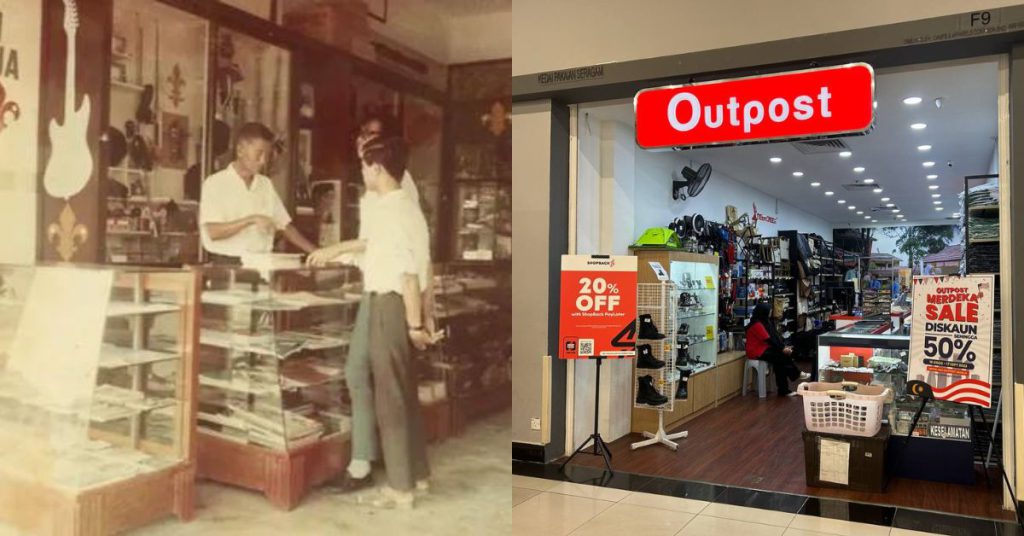
In 1961, Hin Hua Trading was established. Located in Klang, Selangor, Hin Hua Trading was in the business of school co-curricular uniforms and camping equipment.
Its founder, Lai Kam Hong, was a passionate Scout with a love for the great outdoors. He knew firsthand that supplies of Scouts’ uniform were hard to come by at the time, as there weren’t other shops selling them. Instead, you would have to get them from the headquarters.
So, Mr Lai set up a small 200 sq ft shop in the heart of Klang to sell Scout uniforms and basic camping equipment, for the convenience of the Scout community.
This is all according to the company’s current general manager (and grandson of the founder), Colin Lye.
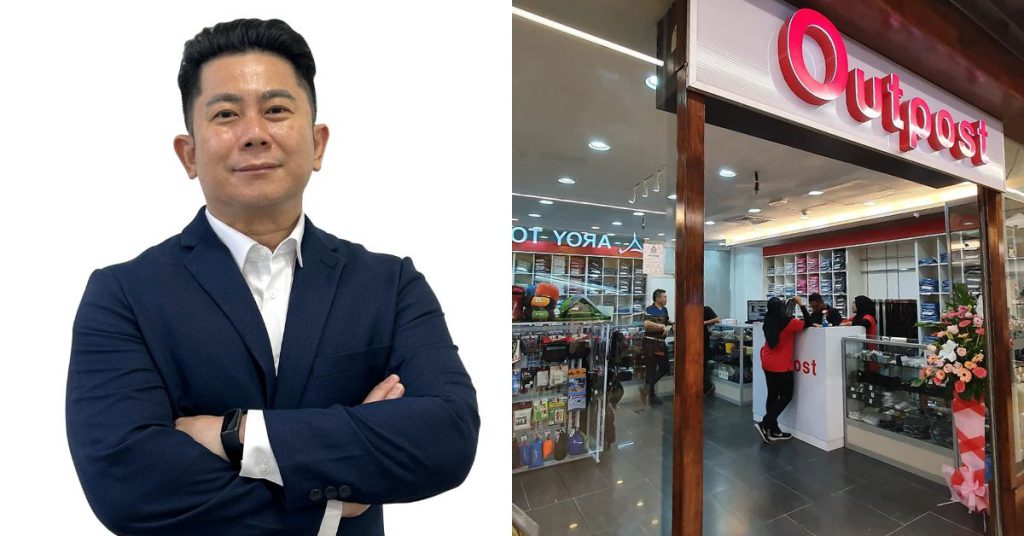
“Mr Lai had to travel to the Scout headquarters in Kuala Lumpur, by bus, which was a grand affair then, to obtain the supplies,” he shared with Vulcan Post. “Thereafter, Mr Lai’s wife started sewing the uniform on a small scale from home and it expanded from there.”
The founder’s passion was passed on to both of his sons, who were actually uniformed men themselves, having served in the Malaysian army for 10 years after high school.
Mr Lai retired at age 70, and that was when his second son, Richard Lye, and his wife, Margaret Lye, joined to assist him with the business.
Prior to that, Richard was in the car industry business, while his wife worked for an airline. Both opted for the uniform business as a retirement venture, and continued to grow the business.
Today, Hin Hua Trading has since evolved into Camps & Apparels Corporation Sdn Bhd, with the more recognisable trade name of OUTPOST.
A new scion
As part of a rebranding exercise, the OUTPOST name was born in 2007, years after Colin Lye joined the family business in 1998.
Prior to joining the company, Colin had been working for one of the big four accounting firms in Malaysia, in the business advisory services department.
But to cope with the increasing demand for school co-curricular uniforms, his parents requested for him to assist with the business.
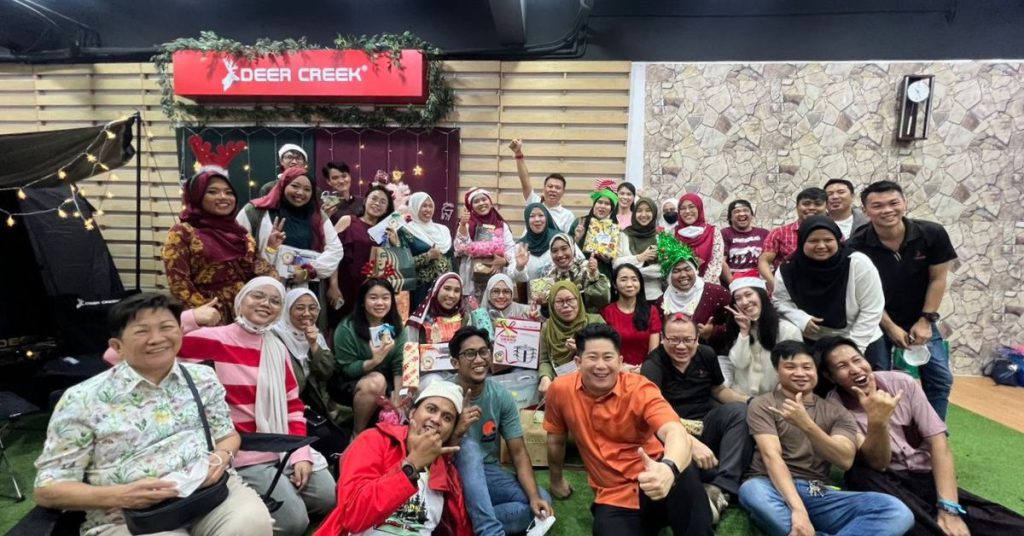
It was a big change for Colin, going from a corporate environment reviewing large financial numbers to attending to walk-in customers as a sales assistant.
However, he was prepared for it, having observed his grandfather and parents operate the business.
“By working behind the counter, it was a good learning experience for me, as I learnt the ropes and understood the customers’ needs,” he explained.
“At the same time, I started to implement best practice organisational and internal controls that I observed from my experiences working with multiple corporate clients, that allowed us to expand from a single shop to 26 retail outlets and growing.”
Today, OUTPOST has an apparel manufacturing facility in Cheras, Pandan Perdana. The uniform products are distributed to OUTPOST retail outlets, though the school uniforms are also available at more than 10 AEON Stores and one SOGO store.
Diversifying from uniformity
More than just uniforms, OUTPOST also does camping products.
“As we started out basically as a scouting shop, it was a natural progression into this product line,” he explained.
They first started by selling other brands, but as customers’ requirements became more apparent, the team began customising their own products, which led to the establishment of Deer Creek, their own brand.

Deer Creek’s camping products are manufactured overseas, but according to the team’s specifications.
“We focused our tent designs based on our local tropical climate, while accounting for affordability and durability,” Colin explained. “One thing we looked into was the waterproofing, which in Malaysia, due to our heavy rainfall, was always a challenge.”
Besides being retailed in OUTPOST outlets, Deer Creek products are also available in more than 40 AEON Stores nationwide, Colin said.
Customers of the brand are entitled to join the DC (Deer Creek) community as well something called the CWDC (Camp with Deer Creek) programme.
“CWDC is a subsidised camping/adventure event for all our customers who own a Deer Creek tent,” Colin shared. “For example, we recently ran a four-wheel drive event in Pos Lemoi, and a white-water rafting event at Gopeng.”
During these events, Deer Creek hosts BBQ activities, movie screenings, and various adventures at a subsidised, affordable rate, making it easier for new campers to experience what camping can be.
A changing industry
The business has changed a lot since it started, from its name as well as its operations.
One of the biggest changes to the brand, Colin shared, is the on-ground engagement, which has pushed OUTPOST to establish a more “fun” branding.
“Through the co-curricular uniform body activities that we organised in collaboration with the Ministry of Education, we slot in games that are fun in order to liven up the atmosphere with the mission of making thousands of kids smile,” Colin said.

Another thing that has changed is the industry’s competitive landscape. Compared to the days of Hin Hua Trading, there are now more uniform competitors, since the number of students have grown nationwide.
That said, Colin pointed out that with such a big market, there is more than enough to be shared among the competitors.
Carrying the legacy
Instead of competing with others, OUTPOST is more about competing with itself, established by its mantra of “Staying Uncomfortable”, which means to never stop innovating and growing.
“We have seen many established brands fall, as they become complacent, and allow their smaller competitors who are hungry to overtake them,” he explained.

One example of OUTPOST staying uncomfortable is by establishing a new production line this year, which is the manufacturing of blazers and jackets.
Compared to the mass production the team is used to, this is a new challenge as it involves highly specialised production.
Being a third-generation general manager may come with a lot of expectations, but also plenty of inspiration.
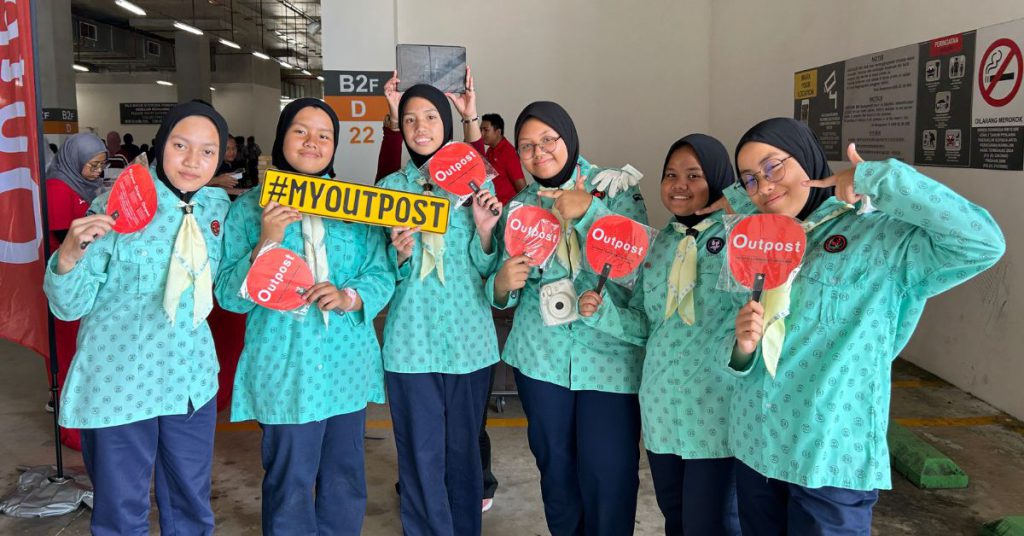
“The pressure of living up to and carrying on the legacy of my grandfather is there. His values of dignity, generosity, and compassion have been instilled in us,” Colin admitted.
However, those values have since translated into initiatives such as OUTPOST’s weekly maths guidance programme, monthly groceries donation programme, donation of pre-loved children’s items, and more.
Going forward, OUTPOST is continuing to expand, particularly by way of franchising.
“We target to open 10 outlets by 2024, where we will be actively recruiting new franchisees and supporting our existing franchisees to expand further.”
Also Read: This free startup event lets founders learn through leaders from Dropee, Fave & Sellercraft
This M’sian went to Italy to learn gelato-making, now her KL parlour serves 180+ flavours
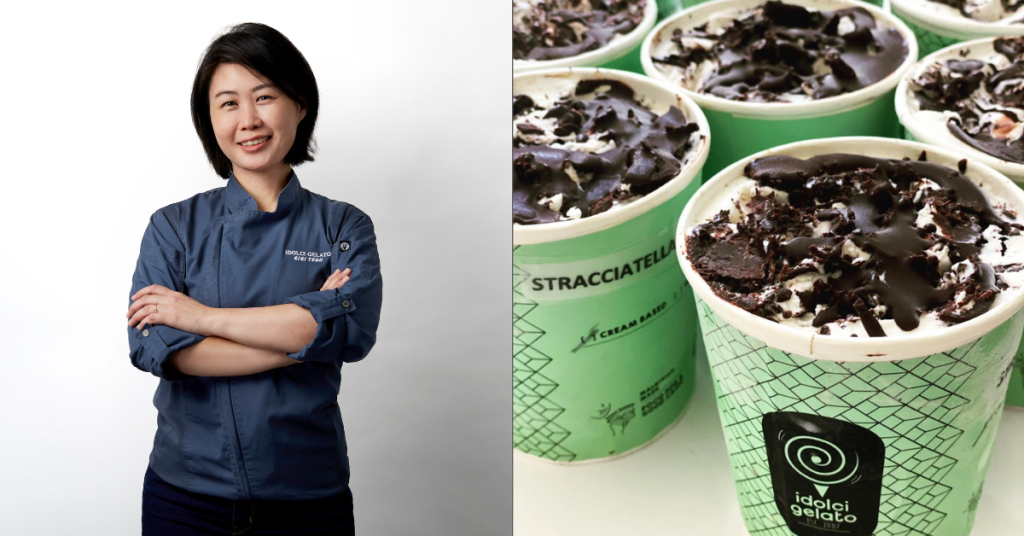
Regarding herself to be more of a chef than an entrepreneur, Gigi Teoh (founder of Idolci Gelato) explained that her idea to start the business was simple.
She always found cooking and making desserts and pastries to be joyful activities. And by launching a gelato business, she could still keep her passion for culinary arts alive while having a constant source of income. “Why not, right?” she quipped.
“During my employment at Four Seasons Hotel (in Singapore), I was trained by Chef Cassian Tan in ice-cream making and that laid the first foundation for my frozen dessert journey,” she confided.
But after a few years of working abroad, she felt really homesick. So she decided to pack up and come back to KL to be closer with her family and friends.

Upon returning, she worked at a gelato company in KL called Selara Cindai that was owned by one Mr Alberto Ciaramicolli. Gigi told us that he was one of the pioneer gelato makers in KL.
Wanting to equip her with the right skills and knowledge in gelato-making, Mr Ciaramicolli sent her off to the birthplace of gelato, Italy. All so she could learn from the local gelato masters in the traditional Italian way.
A few years went by and Mr Ciaramicolli decided to wind down the business to retire.
“That was when I bought his gelato machines. Those machines are easily three to four decades old,” she shared. That marked the beginning of Idolci Gelato.
Expanding its horizons
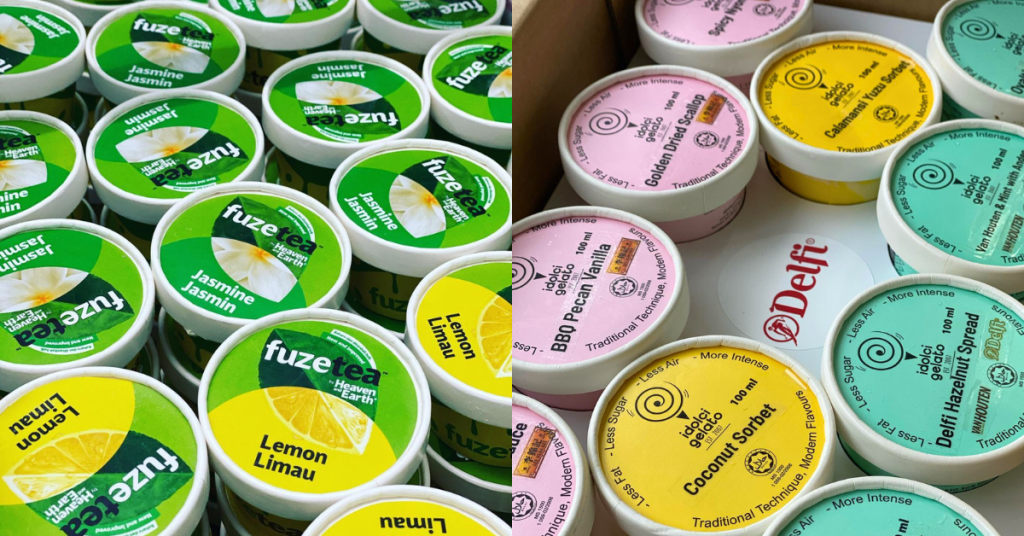
The brand’s core business has been B2B, with Gigi sharing that they supply to five-star hotels and restaurants around the Klang Valley.
Currently, the brand is producing plant-based gelato for IKEA Malaysia. They’ve also recently collaborated with brands like Delfi, Van Houten, Ovaltine, Andes, and Lee Kum Kee to come up with 10 “eccentric” flavour combinations.
During the MCO, the brand adapted to the changing times by extending their business to the B2C field as well. The chef shared that B2C sales are now making up 10% of the business’s revenue.
Customers can order a pint of Idolci Gelato for direct delivery to their chosen address.
As of today, Idolci Gelato proudly boasts a menu of 182 flavours, all of which are halal-certified by JAKIM. They’re on a made-to-order basis, so customers get to enjoy fresh gelato each time.

And surprisingly, they’re still made using the brand’s classic gelato machines that she bought from Mr Ciaramicolli all those years ago. The machines have smaller capacities and churn at a slower rate than modern ones, but Gigi shared that they won’t be replaced just yet.
“These old churners make up for their ‘shortcomings’ by producing finer, smoother, and creamier gelato.” Ingredients-wise, the brand insists on using pistachio and hazelnut paste from Italy, and dairy products and frozen fruits from France.
Everyone deserves a chance to make a living
The brand was started soon after the arrival of her first child, which served to be a great decision in hindsight. Gigi explained that having her own business allowed her more freedom and flexibility to manage her time.
“It enables me to juggle family and work matters more effectively,” she stated. Which also aligns with her initial intention of moving back home to Malaysia.

It’s been said that being a mum and wife while running your own business can be a handful. But Gigi explained that her strong family support system played a vital role in Idolci Gelato’s success, along with her colleagues who are the main pillars of the business.
Interestingly, we learnt that out of her seven colleagues, three of them are deaf individuals and one has a learning disability. “They are doing well at their job and I am very proud of them,” she said.
In terms of communication, Gigi explained that there are no barriers at all because she’s actually proficient in sign language. During her younger days, she took up sign language classes at YMCA, out of an interest to learn.
So when she started Idolci Gelato, she thought, “Why don’t I hire deaf individuals? Differently abled people deserve to be given a chance to make a living just like everyone else.”
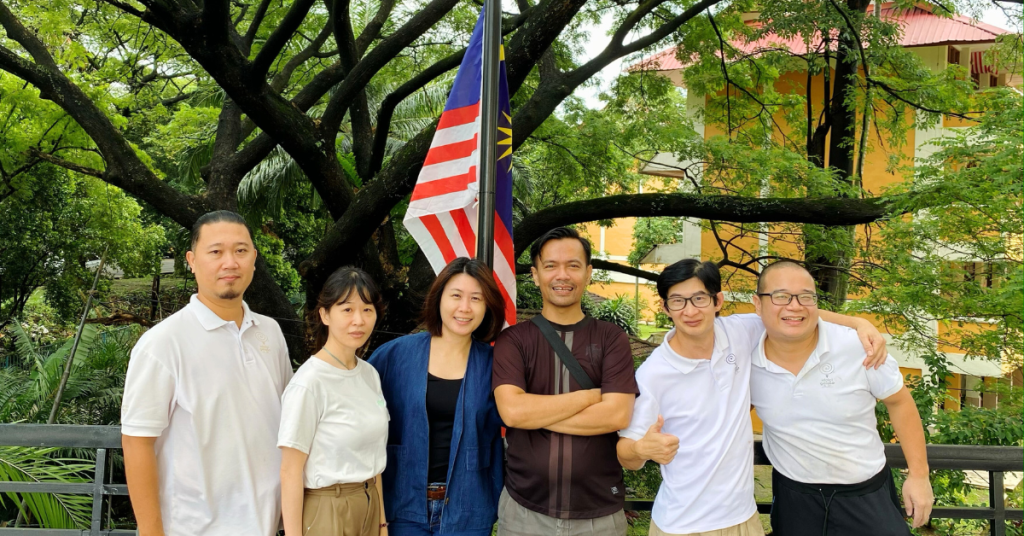
All about quality over quantity
Curious, we asked Gigi how the reception for gelato has changed over the years. To this, she shared that most people were initially unsure of the difference between ice creams and gelato when the brand first started.
“If they could get a soft serve ice cream for 50 sen, they don’t see why they need to pay more for an Italian gelato. But as time goes by, society becomes more affluent, people become more well-informed, more discerning, and health conscious.”
And with that, she shared that the brand has seen an exponential rise in demand for premium quality food. In this case, it’s frozen desserts like gelato.

This can also be seen in the number of ice cream and gelato parlours that have mushroomed over the recent years.
“This is a good sign, it means there are more choices for consumers. The more the merrier,” she quipped. “No two gelato makers can produce the exact same results, therefore there is really nothing to compete over. Personally, I dislike competing with others and putting unnecessary stress on ourselves.”
Speaking candidly, Gigi confided that she doesn’t have any super-ambitious expansion plans for Idolci Gelato. “The heart and soul of my business is to consistently produce the finest gelato for our customers. Quality is everything, nothing else should supersede that.”
Also Read: This free startup event lets founders learn through leaders from Dropee, Fave & Sellercraft
Featured Image Credit: Idolci Gelato
S’pore job market: Demand for AI skills jumps 5x in 4 months, but you need one more than others

Disclaimer: Opinions expressed below belong solely to the author.
2023 will be remembered as the year of artificial intelligence (AI) breaking its way into the mainstream, but not necessarily by making people redundant. Quite the contrary, new jobs and new skills are sought after with the rise of generative AI.
In Singapore, opportunities are quickly multiplying, according to latest data from the global employment website Indeed. From pretty much nil at the beginning of the year, postings have since began popping up at a geometric pace.
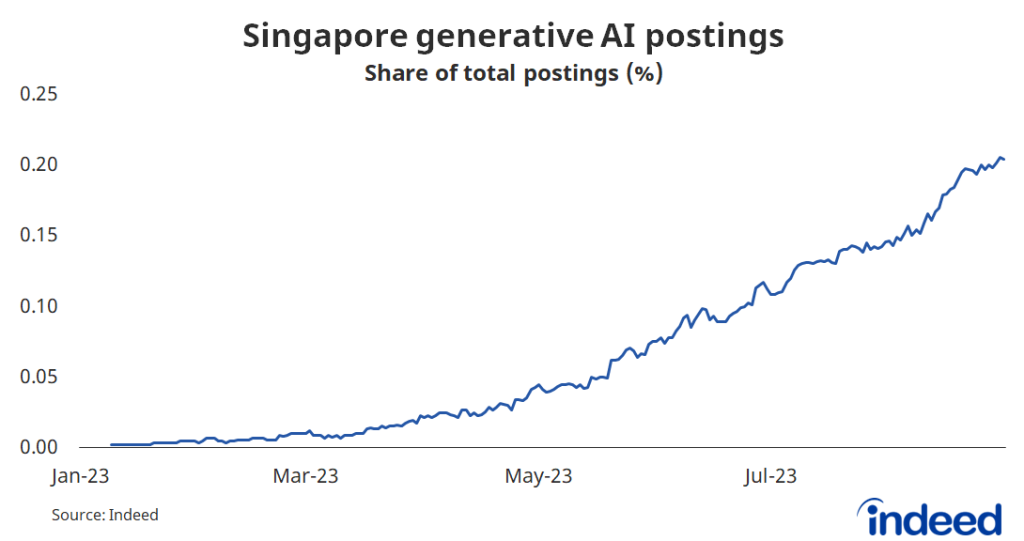
Floodgates are opening
While their number is still relatively small — as of September, one in 490 postings on Indeed contains a mention of such skills — the pace of growth is very high.
It may not seem like a big number, but it is rapidly increasing. Artificial intelligence is hardly new, but it continues to evolve.
This year, we’ve seen the emergence of large language models, such as ChatGPT, which create the illusion of real intelligence. These tools have the potential to fundamentally change the future of work and are already being incorporated into many Singapore jobs.
– Callam Pickering, APAC Senior Economist at Indeed
And they really are. There are nearly twice as many such offers as two months ago and a whopping five times compared to May, just four months back.
Soon, proficiency in AI tools will be just as obvious element of one’s CV as knowing how to use Microsoft Word or Excel. But what does it really mean to be proficient in AI?
One skill to rule them all
With new or updated AI tools being released every couple of months, it’s really hard to specialise in anything in particular.
ChatGPT is no longer just a chatbot, but has now gained the ability to see, hear, speak and even generate images on the fly, with the release of the third version of OpenAI’s Dall-E.
Dall-E, meanwhile, has spent the last 10 to 12 months in the shadow of Midjourney and Stable Diffusion which, in turn, have taken over from Dall-E 2, that was all the rage last year.
There isn’t a single solution you may specialise in to fulfil job requirements over the long run, as it may become obsolete in mere weeks, replaced by the latest version of something else.
30 years ago, people were largely expected to have a career for life, spending decades in one company.
This was later superseded by a trend of jumping jobs every few years — because people enjoyed new environments, but also due to increasing pace of change, driven in major part by technology. The way things were done started changing more rapidly.
With generative AI, it may soon be expected that you acquire new skills on order of months or weeks, staying abreast of the latest changes, or find yourself replaced by someone who can.
Technological adaptability — this is what you need to prove capable of, instead of checking boxes in a CV.
Basic skills that used to be expected of office workers were how to use a Windows PC and several programs of Microsoft Office suite. With a new release every couple of years, you might have been expected to learn about some of the latest features — but that’s about it. And you typically had an IT guy somewhere in the building to help you out if you didn’t quite know how to do something.
Paradoxically, with generative AI tools, this is nowhere near enough. Despite helping us, the technology is also imposing new requirements on human workers.
Telling ChatGPT what you want is hardly a skill, especially as it’s getting better at understanding our intentions, already threatening to make nascent jobs of prompt engineers redundant. Plus, you can’t really master something that itself remains a work in progress, with new features added every few weeks or months.
Knowing how to use AI is largely about tracking its ongoing evolution and exploring new tools for the benefit of your job and company.
AI is pushing humans to become more creative and proactive. You can’t just finish a course, get a certificate, and claim to be proficient at it. Those days may soon be over entirely.
Perhaps, it’s going to slow down with time, as the law of diminishing demand kicks in and the market matures, with several major players dominating it. It would be much easier if we knew what the standards are.
But today, if you want to stand out, you have to prove that you’re smarter not only than other candidates, but the AI bot helping you at your job — and that you know when to ditch it if something better arrives.
Otherwise, if it can already do a growing share of what you’re expected to, what is the value-added by your work?
Featured Image Credit: grop & eamesBot / depositphotos
Also Read: In an impressive video, Tesla Bot recognises own limbs and shows awareness of surroundings
Ant Group expands S’pore presence with launch of new office and Ant International Foundation
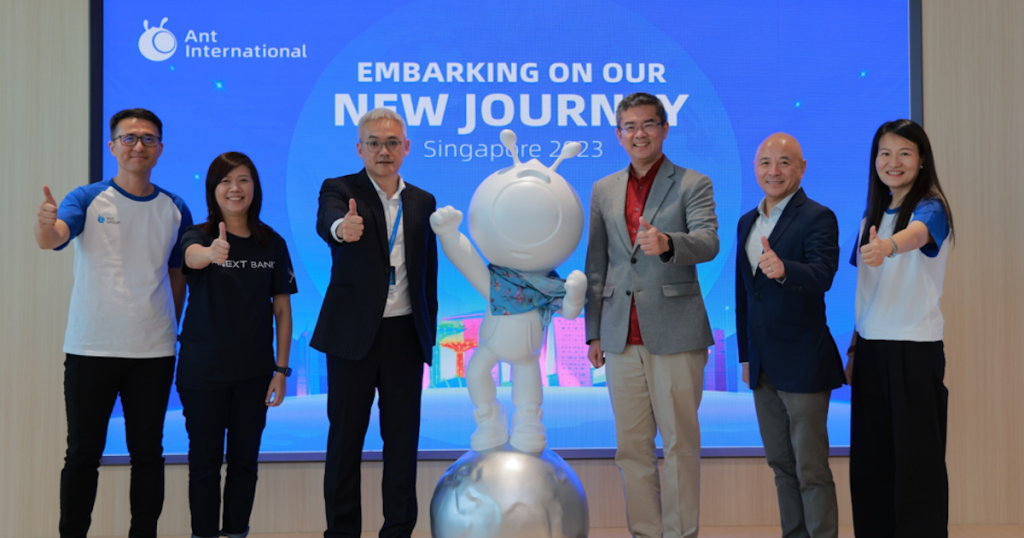
Ant Group, a global leader in digital finance and technology, officially unveiled its new Singapore office yesterday (September 28), reaffirming its commitment to Singapore as a global hub for innovation and sustainable growth.
The inauguration of the office was marked by the launch of the Ant International Foundation (AIF), signalling a new era of collaboration and commitment to global innovation and inclusion.
The office opening and AIF launch ceremony were officiated by Lew Chuen Hong, Chief Executive of the Infocomm Media Development Authority (IMDA), who highlighted the strong partnership between Ant Group and IMDA in fostering trust technologies and digital inclusion.
Eric Jing, Chairman and CEO of Ant Group, emphasised the significance of the new office, stating, “This new office signifies our commitment to enabling our teams in Singapore to continue playing an important role in our international development. In particular, Ant International and the creation of Ant International Foundation mark a new journey for the international development of Ant Group.”
Revolutionising digital commerce
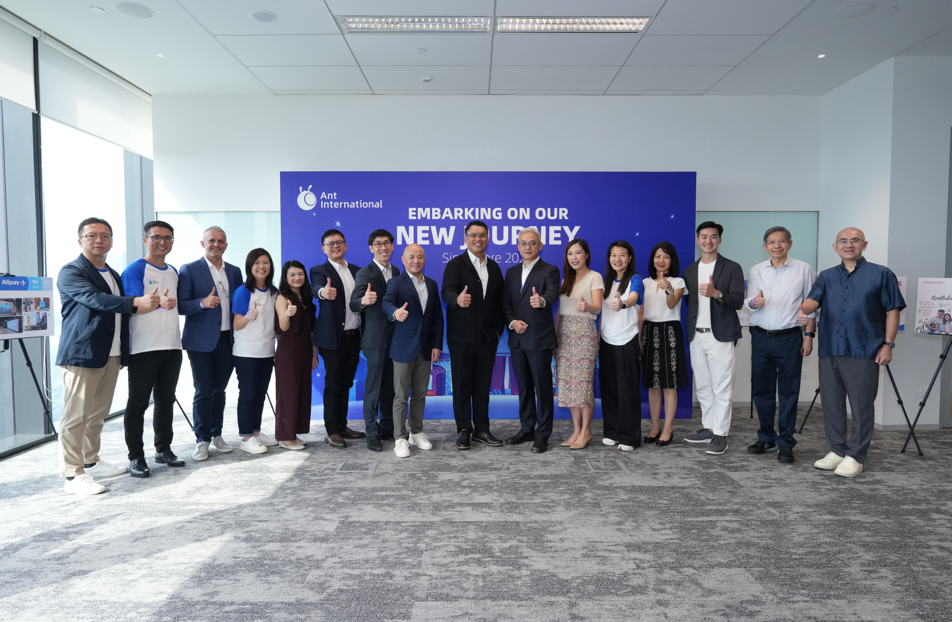
Ant International, the global business unit of Ant Group, aims to revolutionise global commerce through innovative digital solutions.
Peng Yang, the newly-appointed President of Ant International, expressed his enthusiasm for the expansion, saying, “From Singapore, we are extending a global journey towards our unchanging vision: to work with partners to create a future commerce where every individual and every business may harness the power of digital technologies to achieve sustainable growth.”
Ant Group’s current operations include Alipay+, a suite of global cross-border payments and marketing solutions, and WorldFirst, which offers cross-border payment, foreign exchange, and funds management services.
Additionally, ANEXT Bank, a digital wholesale bank incorporated and licensed in Singapore, is dedicated to providing digital financing services for regional SMEs.
Ant International also announced its increased investment in Singapore for cutting-edge technologies such as privacy-preserving computing and Web 3.0 innovations, reinforcing its dedication to trust and efficiency in digital commerce.
AIF to collaborate with global partners
The launch of the Ant International Foundation (AIF) is a significant step in Ant Group’s commitment to sustainable growth and innovation. AIF, to be based in Singapore, will focus on environmental protection, digital inclusion, and the cultivation of digital leadership and talents.
Leiming Chen, Chief Sustainability Officer of Ant International, noted that AIF aims to collaborate with global partners to amplify its positive impact.
Among its global partners are the 10×1000 Tech for Inclusion Project, the Green Digital Finance Alliance, and the Forum of Young Global Leaders, all of which aim to promote tech inclusion, environmental sustainability, and leadership development.
Ant Group’s expanded presence in Singapore and the launch of the Ant International Foundation mark a significant milestone in its mission to drive innovation, inclusivity, and sustainability on a global scale, reinforcing its position as a pioneering force in the digital finance and technology sector.
Featured Image Credit:
Also Read: How Ant Group’s ANEXT Bank is empowering MSMEs and redefining financial inclusion in Singapore

